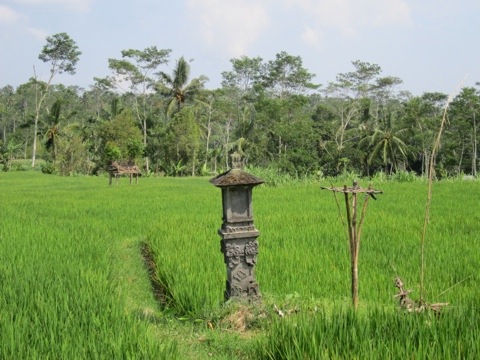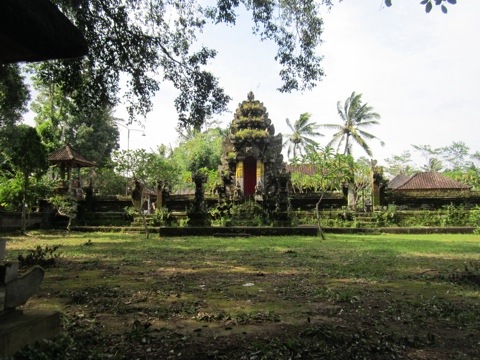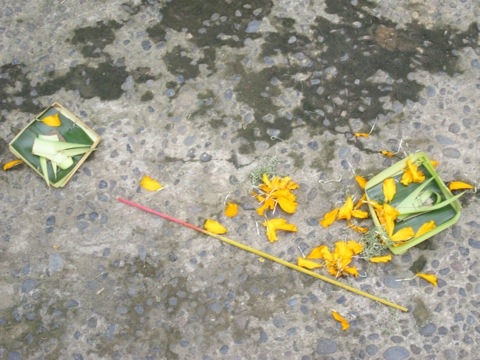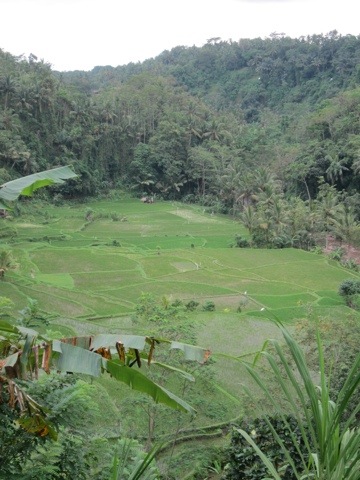In this world there is so much beauty in the physical: clear blue waters playfully tickling white sandy shores, emerald mountains filled with ferns caressing each crevasse, exotic faces smiling with their entire beings, bright and juicy jewels of fruit hanging from their coiled vines. Physical beauty and allure is easy to find, especially when one is infatuated with newness. One type of beauty that has become more elusive as outer beauty shoves it’s way further out onto the world’s center stage is inner beauty: peace, humility, acceptance and happiness.
In Ubud, probably one of the friendliest places of all, there is so much physical beauty. There are bright green rice terraces as far as the eyes can see, intricate stone carvings telling the stories of how things began, waterfalls of clear and clean drops of life pouring down black stone, and colors of the rainbow filling plates and taste buds. However, what amazes me the most are the people, so welcoming, so happy, so willing to share, and so humble. To me, they posses true beauty.
When we first arrived, we visited a restaurant nearby Villa Areklo, where we had the great pleasure of staying. There we met the manager Agung, like the Balinese volcano. He was a young man with laughter shining in his eyes. He began to share his story, which helped us understand the complexities of Balinese culture.

The first thing he shared with us was the way children are named; one, two, three, four, and if by chance a mother bears more children than four, the fourth is once again named one. Wayan, Made, Nyoman, and Ketut are the most commonly use names. The next important part of introducing oneself, besides what number you are, is what caste you belong to. The highest class is made up of holy men and priests, the Brahmins. The second highest class is made up of warriors and nobles, the Ksatrias. Next comes the administrative and merchant caste, the Wasias. The last and largest are the Shudras. Men born into a caste are usually there for life, while a woman can marry up. Your caste determines how people will treat you in a relationship, working or otherwise, but one thing I noticed in Bali, and what our bike tour guide Mun said to us is true, “In Bali, I am you and you are me. We respect each other.” This wasn’t just some lip serviced cultural propaganda either, as I saw it in everyone, everyday.
After our meal Agung invited us to his home, in a village called Lovina on the northwest shore of Bali. He wanted us to spend Galungan, a huge Balinese traditional celebration, with him and his family. We couldn’t believe the open heart of this smiling Buddha of a man we had just met, and we came to find that nearly everyone is this way. The people here do not make you feel like you are an outsider, or merely a dollar sign. They genuinely care about you enjoying, learning, and exploring. I am you and you are me.
The next night we met Mush at the Jazz Cafe, and he told us of his place in this culture, of his hopes and dreams, his vision of the beautiful life in California, and of his hopes and dreams for B and I. We must have spent at least an hour just sharing pieces of each other on the veranda in the hot yet sweet Ubud air. This cycle continued, and I began to fall in love with this place for the beauty of its people even more than the beauty of its land.

The humble nature of the Balinese exudes from every pore of its culture. Not only from the relationships and conversations with people, but also with the Gods. On this island, there are over 20,000 temples. Every shop, no matter how tiny, will have a stone altar at which they will leave the offerings of the day. Each family compound, which has a temple that is usually much more grand than the homes in which they live, displays the unwavering belief that one must be humble before God. In America and around the world we see many examples of people preaching this message only to go home in their expensive cars to lavish homes. Not here. Words here actually mean something.
Each day the altars adorning a home, shop, or temple, will be visited by a beautiful woman carrying a tray of offerings: flowers, crackers or rice, incense, and sometimes cigarettes. They are carefully placed in a banana leaf basket and offered with a swift but steady movement of the woman’s trained hand and a splash of a special water. I was amazed at the time and effort put into this practice, even though the baskets would be trampled over or knocked down by monkeys wanting an easy meal in a matter of moments. That made no difference, it had to be done, it was a matter of respect.

After becoming a bit jaded by the face saving culture of China, I needed something like this in my life. To see that in some places in the world, people are still happy without antidepressants and mansions, to see that culture mattered and should be saved and passed down, to see that in some places in the world people respect each other, even without having to do a song and dance to earn it. Suksama, thank you, for giving me hope once again.
